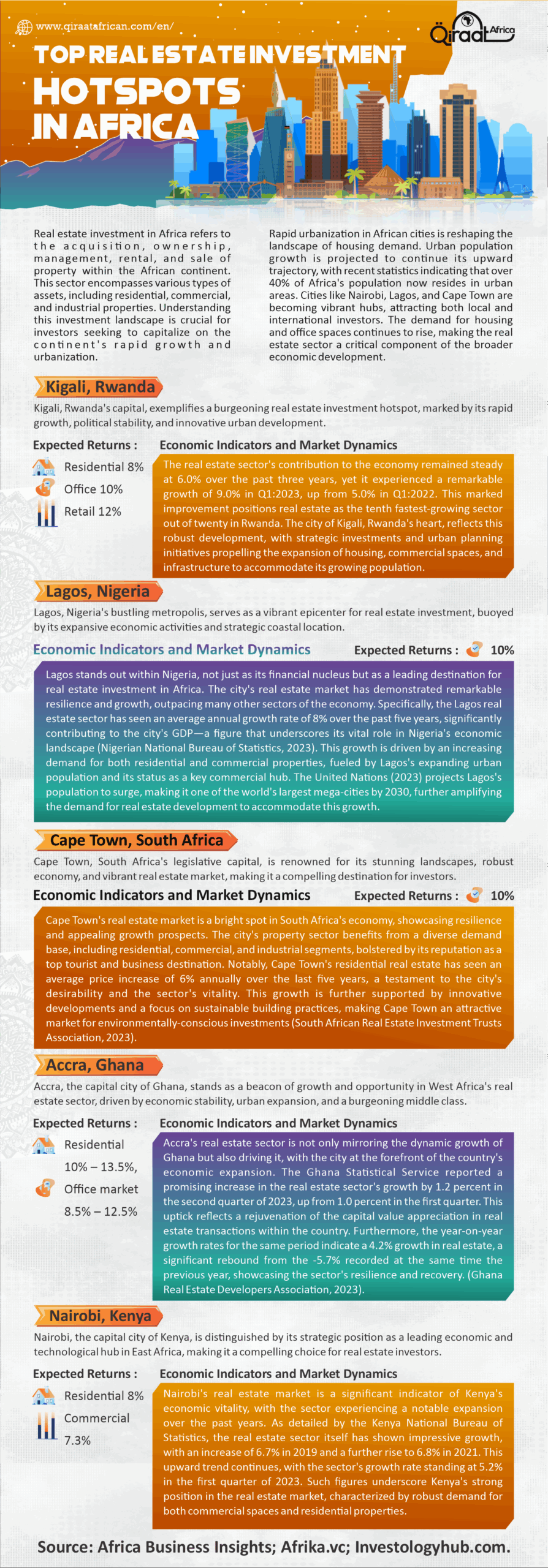Real estate investment in Africa refers to the acquisition, ownership, management, rental, and sale of property within the African continent. This sector encompasses various types of assets, including residential, commercial, and industrial properties. Understanding this investment landscape is crucial for investors seeking to capitalise on the continent’s rapid growth and urbanisation.
Rapid urbanisation in African cities is reshaping the landscape of housing demand. Urban population growth is projected to continue its upward trajectory, with recent statistics indicating that over 40% of Africa’s population now resides in urban areas. Cities like Nairobi, Lagos, and Cape Town are becoming vibrant hubs, attracting both local and international investors. The demand for housing and office spaces continues to rise, making the real estate sector a critical component of the broader economic development.

- Kigali, Rwanda
Expected Returns : Residential 8%, Office 10%, Retail 12%
Kigali, Rwanda’s capital, exemplifies a burgeoning real estate investment hotspot, marked by its rapid growth, political stability, and innovative urban development.
Economic Indicators and Market Dynamics
The real estate sector’s contribution to the economy remained steady at 6.0% over the past three years, yet it experienced remarkable growth of 9.0% in Q1:2023, up from 5.0% in Q1:2022. This marked improvement positions real estate as the tenth fastest-growing sector out of twenty in Rwanda. The city of Kigali, Rwanda’s heart, reflects this robust development, with strategic investments and urban planning initiatives propelling the expansion of housing, commercial spaces, and infrastructure to accommodate its growing population.
- Lagos, Nigeria
Expected Returns : 10%
Lagos, Nigeria’s bustling metropolis, serves as a vibrant epicentre for real estate investment, buoyed by its expansive economic activities and strategic coastal location.
Economic Indicators and Market Dynamics
Lagos stands out within Nigeria, not just as its financial nucleus but as a leading destination for real estate investment in Africa. The city’s real estate market has demonstrated remarkable resilience and growth, outpacing many other sectors of the economy. Specifically, the Lagos real estate sector has seen an average annual growth rate of 8% over the past five years, significantly contributing to the city’s GDP—a figure that underscores its vital role in Nigeria’s economic landscape (Nigerian National Bureau of Statistics, 2023). This growth is driven by an increasing demand for both residential and commercial properties, fuelled by Lagos’s expanding urban population and its status as a key commercial hub. The United Nations (2023) projects Lagos’s population to surge, making it one of the world’s largest megacities by 2030, further amplifying the demand for real estate development to accommodate this growth.
- Cape Town, South Africa
Expected Returns : 10%
Cape Town, South Africa’s legislative capital, is renowned for its stunning landscapes, robust economy, and vibrant real estate market, making it a compelling destination for investors.
Economic Indicators and Market Dynamics
Cape Town’s real estate market is a bright spot in South Africa’s economy, showcasing resilience and appealing growth prospects. The city’s property sector benefits from a diverse demand base, including residential, commercial, and industrial segments, bolstered by its reputation as a top tourist and business destination. Notably, Cape Town’s residential real estate has seen an average price increase of 6% annually over the last five years, a testament to the city’s desirability and the sector’s vitality. This growth is further supported by innovative developments and a focus on sustainable building practices, making Cape Town an attractive market for environmentally conscious investments (South African Real Estate Investment Trusts Association, 2023).
- Accra, Ghana
Expected Returns : Residential 10% – 13.5%, Office market 8.5% – 12.5%
Accra, the capital city of Ghana, stands as a beacon of growth and opportunity in West Africa’s real estate sector, driven by economic stability, urban expansion, and a burgeoning middle class.
Economic Indicators and Market Dynamics
Accra’s real estate sector is not only mirroring the dynamic growth of Ghana but also driving it, with the city at the forefront of the country’s economic expansion. The Ghana Statistical Service reported a promising increase in the real estate sector’s growth by 1.2 per percent in the second quarter of 2023, up from 1.0 per cent in the first quarter. This uptick reflects a rejuvenation of the capital value appreciation in real estate transactions within the country. Furthermore, the year-on-year growth rates for the same period indicate a 4.2% growth in real estate, a significant rebound from the -5.7% recorded at the same time the previous year, showcasing the sector’s resilience and recovery. (Ghana Real Estate Developers Association, 2023).
- Nairobi, Kenya
Expected Returns : Residential 8%, Commercial 7.3%
Nairobi, the capital city of Kenya, is distinguished by its strategic position as a leading economic and technological hub in East Africa, making it a compelling choice for real estate investors.
Economic Indicators and Market Dynamics
Nairobi’s real estate market is a significant indicator of Kenya’s economic vitality, with the sector experiencing a notable expansion over the past years. As detailed by the Kenya National Bureau of Statistics, the real estate sector itself has shown impressive growth, with an increase of 6.7% in 2019 and a further rise to 6.8% in 2021. This upward trend continues, with the sector’s growth rate standing at 5.2% in the first quarter of 2023. Such figures underscore Kenya’s strong position in the real estate market, characterised by robust demand for both commercial spaces and residential properties.
Source: Africa Business Insights; Afrika.vc; Investologyhub.com.


























































